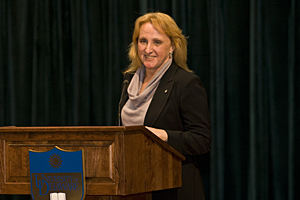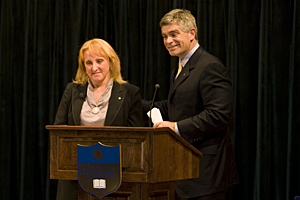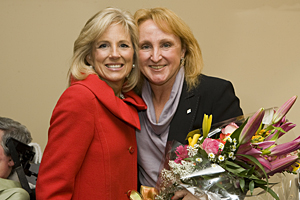

ADVERTISEMENT
- Rozovsky wins prestigious NSF Early Career Award
- UD students meet alumni, experience 'closing bell' at NYSE
- Newark Police seek assistance in identifying suspects in robbery
- Rivlin says bipartisan budget action, stronger budget rules key to reversing debt
- Stink bugs shouldn't pose problem until late summer
- Gao to honor Placido Domingo in Washington performance
- Adopt-A-Highway project keeps Lewes road clean
- WVUD's Radiothon fundraiser runs April 1-10
- W.D. Snodgrass Symposium to honor Pulitzer winner
- New guide helps cancer patients manage symptoms
- UD in the News, March 25, 2011
- For the Record, March 25, 2011
- Public opinion expert discusses world views of U.S. in Global Agenda series
- Congressional delegation, dean laud Center for Community Research and Service program
- Center for Political Communication sets symposium on politics, entertainment
- Students work to raise funds, awareness of domestic violence
- Equestrian team wins regional championship in Western riding
- Markell, Harker stress importance of agriculture to Delaware's economy
- Carol A. Ammon MBA Case Competition winners announced
- Prof presents blood-clotting studies at Gordon Research Conference
- Sexual Assault Awareness Month events, programs announced
- Stay connected with Sea Grant, CEOE e-newsletter
- A message to UD regarding the tragedy in Japan
- More News >>
- March 31-May 14: REP stages Neil Simon's 'The Good Doctor'
- April 2: Newark plans annual 'wine and dine'
- April 5: Expert perspective on U.S. health care
- April 5: Comedian Ace Guillen to visit Scrounge
- April 6, May 4: School of Nursing sponsors research lecture series
- April 6-May 4: Confucius Institute presents Chinese Film Series on Wednesdays
- April 6: IPCC's Pachauri to discuss sustainable development in DENIN Dialogue Series
- April 7: 'WVUDstock' radiothon concert announced
- April 8: English Language Institute presents 'Arts in Translation'
- April 9: Green and Healthy Living Expo planned at The Bob
- April 9: Center for Political Communication to host Onion editor
- April 10: Alumni Easter Egg-stravaganza planned
- April 11: CDS session to focus on visual assistive technologies
- April 12: T.J. Stiles to speak at UDLA annual dinner
- April 15, 16: Annual UD push lawnmower tune-up scheduled
- April 15, 16: Master Players series presents iMusic 4, China Magpie
- April 15, 16: Delaware Symphony, UD chorus to perform Mahler work
- April 18: Former NFL Coach Bill Cowher featured in UD Speaks
- April 21-24: Sesame Street Live brings Elmo and friends to The Bob
- April 30: Save the date for Ag Day 2011 at UD
- April 30: Symposium to consider 'Frontiers at the Chemistry-Biology Interface'
- April 30-May 1: Relay for Life set at Delaware Field House
- May 4: Delaware Membrane Protein Symposium announced
- May 5: Northwestern University's Leon Keer to deliver Kerr lecture
- May 7: Women's volleyball team to host second annual Spring Fling
- Through May 3: SPPA announces speakers for 10th annual lecture series
- Through May 4: Global Agenda sees U.S. through others' eyes; World Bank president to speak
- Through May 4: 'Research on Race, Ethnicity, Culture' topic of series
- Through May 9: Black American Studies announces lecture series
- Through May 11: 'Challenges in Jewish Culture' lecture series announced
- Through May 11: Area Studies research featured in speaker series
- Through June 5: 'Andy Warhol: Behind the Camera' on view in Old College Gallery
- Through July 15: 'Bodyscapes' on view at Mechanical Hall Gallery
- More What's Happening >>
- UD calendar >>
- Middle States evaluation team on campus April 5
- Phipps named HR Liaison of the Quarter
- Senior wins iPad for participating in assessment study
- April 19: Procurement Services schedules information sessions
- UD Bookstore announces spring break hours
- HealthyU Wellness Program encourages employees to 'Step into Spring'
- April 8-29: Faculty roundtable series considers student engagement
- GRE is changing; learn more at April 15 info session
- April 30: UD Evening with Blue Rocks set for employees
- Morris Library to be open 24/7 during final exams
- More Campus FYI >>
6:33 p.m., Nov. 5, 2009----Lynn Snyder-Mackler, Alumni Distinguished Professor of Physical Therapy at the University of Delaware, delivered the 2009 Francis Alison Lecture on Wednesday afternoon, Nov. 4, at the Roselle Center for the Arts. The event drew a large crowd of academic colleagues, family members and friends, including Delaware's first lady, Carla Markell.
Snyder-Mackler was also honored by a surprise visit from Vice President Joe Biden's wife, Jill, and his sister, Valerie Biden Owens. The pair delivered flowers to Snyder-Mackler, whose work on knee injuries and rehabilitation has affected the lives of many in Delaware and beyond.
“Someone told me that people asked me more questions at the Alison luncheon than any other award recipient has gotten,” Snyder-Mackler said. “That's just because everyone has knees.”
Snyder-Mackler's lecture -- “When Can I Walk (Run, Drive or Play) Again?” -- demonstrated that she is not only a scholar-schoolmaster like the 18th century educator for whom the award is named but also a clinician.
“I am a physical therapist,” she said, “and I always want to bring research back to the clinic.” Snyder-Mackler's entire career has been geared toward providing laboratory evidence to back clinical treatment decisions.
She began her presentation by showing photos of the many doctoral candidates she has advised and mentored during her 20 years at UD. “Most speakers save this part for the end,” she said, “but I'm starting with my students because they are how the work gets done.” Many were in the audience, including Kristin Briem, who is now an assistant professor of physiotherapy at the University of Iceland.
One of Snyder-Mackler's areas of research and clinical interest is knee injuries, particularly rupture of the anterior cruciate ligament, or ACL. More than 100,000 new cases of this injury are treated annually.
Treatment of ACL ruptures, however, is controversial. While two categories of patients, known as copers and noncopers, have been identified, a lack of effective screening methods to predict whether an individual will cope or not has resulted in an overwhelming push toward early surgery in the United States.
Snyder-Mackler and her research team are developing and testing a screening examination, consisting of hop tests and other measures, that will help in identifying candidates for nonsurgical treatment. She has had to turn to institutions overseas, where standard practice is to wait at least six months for surgical intervention, for access to a group of nonoperatively managed patients.
“What we're starting to see,” she said, “is that some people previously identified as noncopers are actually candidates for nonsurgical rehabilitation. But we would not have learned that just by studying patients here, because in the U.S. just about everyone goes to surgery within six to eight weeks of sustaining the injury.”
“We're challenging tradition,” she said, “by showing that the blanket practice of surgical intervention is not supported.”
Snyder-Mackler admitted that clinical research is messy. “It's not black and white,” she said. “Most of the time it's shades of gray. But as long as your findings are stronger than your errors, you're moving in the right direction.”
For Snyder- Mackler, the right direction is always toward a high level of functioning for the patient.
“Close to 500,000 total knee replacements are performed every year,” she said, “and the number is increasing because we're getting older and we're getting heavier.”
While most patients report reduced pain and improved range of motion after surgery, they are functionally not comparable to age-matched healthy control subjects.
“We're seeing a 40 to 50 percent deficit in quadriceps strength,” Snyder-Mackler said. “Is this good enough? As a physical therapist, I don't think it is.”
UD's Physical Therapy Clinic provides a living laboratory for the research Snyder-Mackler and her students are doing, as well as a setting for her students to learn practical clinical skills. “The clinic is where the rubber meets the road,” she said. “It's where we test out a lot of our research.”
After two decades at UD, Snyder-Mackler remains excited about both her ongoing work and the host of new opportunities here in health science, including the recently formed Delaware Health Sciences Alliance and the planned Delaware Rehabilitation Institute. The newly acquired Chrysler site also offers the potential for new collaborations and clinical practice options.
During the ensuing question-and-answer session, someone in the audience asked Snyder-Mackler how she plans to “crack the 77 percent of surgeons” who believe that surgery should be the first response to an ACL tear. “Evidence,” she responded. “It's slow, but it's happening.”
“One of the best things about having so many people go through our program and then go out and work throughout the country,” she added, “is that I know in 10 years we'll have more answers.”
After the lecture, UD President Patrick Harker presented Snyder-Mackler with a medal and officially inducted her into the Alison Society.
In his brief testimonial, Harker recognized Snyder-Mackler for not only the high quality of her work but also her enthusiasm for it and her determination to get answers. “You keep digging, keep asking, keep looking,” he said.
“We all saw the pictures at the beginning of her presentation,” he continued. “Among Lynn's most remarkable gifts is her love of teaching and her generous interaction not just with fellow researchers, colleagues and clinicians, but with students -- students who have lined up to add their praise to the quickly deafening chorus.”
“There are not many who could keep up a research agenda as significant as Lynn's -- as internationally lauded -- without sacrificing time dedicated elsewhere. And, yet, Lynn collaborates with scientists worldwide, she drives the research advancing knowledge and clinical practice in her field, and she writes and lectures prolifically.”
An international leader in the field of orthopedic rehabilitation research, Snyder-Mackler is the first faculty member in the College of Health Sciences to be named an Alison Scholar and the third woman among the 29 recipients of the award to date.
She currently is an investigator on more than $6 million in research projects funded by the National Institutes of Health and several foundations.
She also is the recipient of numerous awards from the American Physical Therapy Association, which named her a Catherine Worthingham Fellow, the highest honor in the profession, in 2003.
A prolific author, Snyder-Mackler has written more than 100 research articles, 30 book chapters and monographs, and textbooks on electrotherapy and sports physical therapy. She serves on the editorial boards of the Journal of Orthopedic and Sports Physical Therapy, Journal of Sports Rehabilitation and Physical Therapy in Sport and has given more than 165 presentations on her research in the U.S. and 12 foreign countries.
Her study results also have been reported by The New York Times, USA Today, United Press International and other major media.
Article by Diane Kukich
Photos by Ambre Alexander



